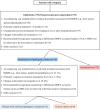Clinical usefulness of next-generation sequencing-based target gene sequencing in diagnosis of inherited bone marrow failure syndrome
- PMID: 40358701
- PMCID: PMC12141389
- DOI: 10.1007/s00277-025-06392-0
Clinical usefulness of next-generation sequencing-based target gene sequencing in diagnosis of inherited bone marrow failure syndrome
Abstract
Inherited bone marrow failure syndromes are genetic hematologic disorders with increased cancer risk. Accurate diagnosis is crucial for appropriate management. This study assessed the clinical usefulness of next-generation sequencing (NGS)-based target gene sequencing in pediatric and AYA (adolescent and young adult) patients with hematologic abnormalities. From December 2019 to June 2023, 93 patients with suspected congenital hematologic diseases at a single institution underwent NGS-based testing. Medical records were retrospectively reviewed. The median age at diagnosis was 9.3 years (range 0.2-31.4), with 59.1% males. Indications for testing included specific medical histories (28 patients), persistent cytopenia or recurrent neutropenic fever (22 patients), changes in cytopenia patterns (11 patients), and other reasons (32 patients). Pathogenic variants were identified in 9/28 (32.1%), 3/22 (13.6%), 4/11 (36.4%), and 0/32 (0%). Overall, 16 patients (17.2%) had pathogenic variants, including FANCA, BRCA2, PMS2, ELANE, G6PC3 and VPS13B in patients with idiopathic neutropenia, and GATA2 in patients with suspected myelodysplastic syndrome. Genetic findings led to diagnostic revisions in 12 patients (12.9%), including reclassification of aplastic anemia (AA) as Fanconi anemia, Diamond-Blackfan anemia, or Shwachman-Diamond syndrome, prompting hematopoietic stem cell transplantation and altering cancer surveillance. Pathogenic variants were more frequently observed in patients with a specific medical history or changes in cytopenia, and in those with additional clinical features (cytogenetic abnormalities or non-severe AA). This study demonstrated the diagnostic usefulness of NGS-based target gene sequencing for pediatric and AYA patients with suspected genetic hematologic disorders, supporting the need for multicenter studies and standardized guideline development.
Keywords: Cytopenia; Inherited bone marrow failure syndrome; Next-generation sequencing.
© 2025. The Author(s).
Conflict of interest statement
Declarations. Ethics approval and consent to participate: This study was approved by the Institutional Review Board of the Seoul National University Hospital (IRB number: 2306-177-1443). As this study involved only a review of medical records and no additional interventions for patients, the requirement for written consent was waived. Consent for publication: Not applicable. Competing interests: The authors declare no competing interests.
Figures


References
-
- Gálvez E, Vallespín E, Arias-Salgado EG, Sánchez-Valdepeñas C, Giménez Y, Navarro S, Río P, Bogliolo M, Pujol R, Peiró M, Nevado J, Zubicaray J, Sebastián E, Catalá A, Beléndez C, Díaz de Heredia C, Galera A, Badell I, Madero L, Perona R, Sastre L, Surrallés J, Bueren J, Lapunzina P, Sevilla J (2021) Next-generation sequencing in bone marrow failure syndromes and isolated cytopenias: Experience of the Spanish Network on Bone Marrow Failure Syndromes. Hemasphere 5(4). 10.1097/HS9.0000000000000539 - DOI - PMC - PubMed
MeSH terms
LinkOut - more resources
Full Text Sources
Medical
Miscellaneous

